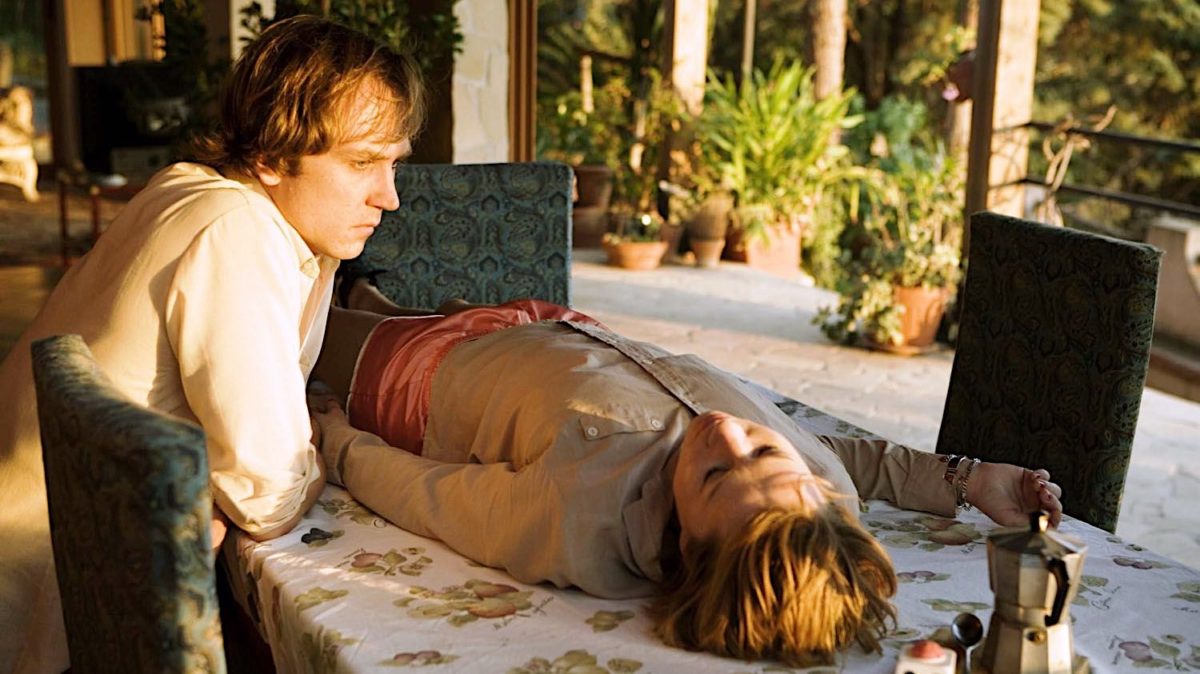Following the critical acclaim of her third feature Toni Erdmann (2016) at the Cannes Film Festival, Maren Ade became a household name among German audiences with her film grossing nearly $5 million at the box-office and sweeping five awards at the 26th European Film Awards—including Best Director, making her the first woman film-maker to win that award. The 162-minute oddball dramedy follows business woman Ines (Sandra Hüller) during a work trip to Bucharest, in which she is surprised by her estranged father Winfried (Peter Simonischek), who attempts to rekindle their relationship and reintroduce a little humour in her life by accosting her through a series of absurd pranks. Toni Erdmann earned Ade a nomination in the Best Foreign Language Film category at the 89th Academy Film Awards and was ranked as the best film in 2016 by Cahiers du Cinéma, Sight & Sound, and Film Comment. Its commercial success has led to an American remake in development with Kristen Wiig attached, and Winfried’s iconic Kukeri costume can be found gracing Berlin’s Deutsche Kinemathek, demonstrating that Ade has not only made her mark in contemporary cinema, but she has successfully evoked the spirit of the Berlin School movement by capturing the zeitgeist in Germany in a way that feels pertinent to its native audiences—as Ade has once stated, “everyday conflicts are as big, powerful and dramatic as any other,” and evidently, this perspective has been universally celebrated by all.
Unlike the majority of her peers, Ade’s background and creative stance is however distinctly untethered to the Berlin School movement. Ade has admitted that she disapproves of having her work encompassed by this term, considering that the directors in question did not coin it themselves. However, she is an avid supporter of other German directors in her field, working with frequent collaborator Valeska Grisebach, who helped write the script for Everyone Else (2009), while Ade produced her critical hit Western (2017). Born in Karlsruhe, West Germany, Ade studied film production, media management, and film direction at the University of Television and Film in Munich, where she would eventually co-found the production company Komplizen Film with Janine Jackowski in 2001. Through Komplizen Film, Ade was able to produce her first feature length film The Forest for the Trees (Der Wald vor lauter Bäumen, 2003), which follows protagonist Melanie (Eva Löbau), an idealistic, socially awkward teacher who finds difficulty in controlling her students and making new friends after moving to Karlsruhe. Shot through Melanie’s point of view, each cringe-worthy encounter initially plays out as situational comedy, yet with every failed attempt to connect with other people, Melanie’s predicament unveils a desperate depiction of an introverted woman crippled by her own anxieties. While The Forest for the Trees currently remains Ade’s only feature set in Germany, it establishes themes which are unequivocally in line with the Berlin School’s disposition and would continue to prevail in her work: Ade’s vignettes of modern German life explore the every-day, mundane interactions we take for granted to expose the protagonists’ self-inflicted alienation in attempting to realise their conflicting desires for human connection and social integration.
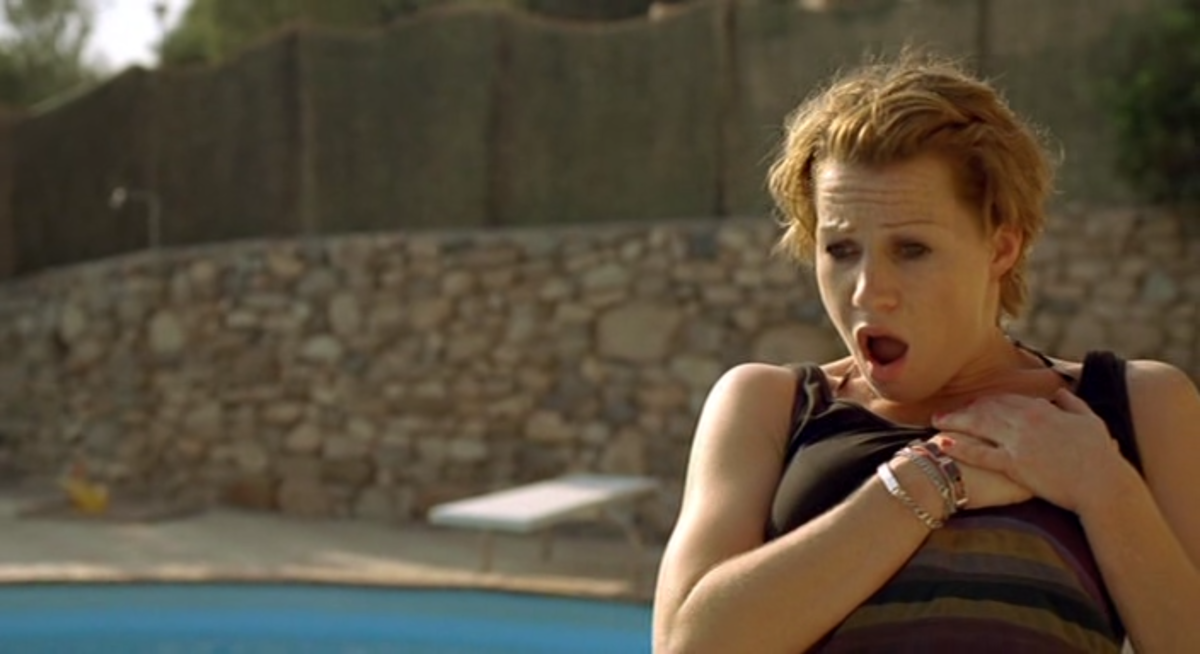
Ade’s Everyone Else (Alle Anderen, 2009), while greatly underrated in comparison to the beloved Toni Erdmann, offers a nuanced outlook on these themes in relation to gender performativity and heteronormative relationships, bringing into question the extent of which our behaviour is an artifice. The film opens with a familiar domestic setting: Chris (Lars Eidinger) is lying down on the settee quietly tending to an infant, while in the kitchen Gitti (Birgit Minichmayr) is playfully arguing with Rebecca, an unimpressed little girl. At first glance, one might mistake them for a German nuclear family—white, middle-class, preoccupied with recreational activities in their comfortable, spacious home—yet as Chris continues to dote on the baby outdoors, his sister greets him and her child, commending him on how fatherhood “suits him very well.” Their warm exchange is all too abruptly disrupted by his girlfriend Gitti, who has now chased his niece Rebecca out into the open. Clocking that she has a captive audience, Gitti begins to confront the girl about why she won’t warm up to her, and worse, why she won’t even tell her if it’s something she can change about herself. Then, in slapstick-spectacle, Gitti dares Rebecca to declare her hatred towards her with a venomous hiss, punctuated by a pantomime gunshot which leaves Gitti agasp, staggering into the pool, and left for dead. By encouraging uninhibited behaviour in Rebecca, Gitti may have gained the respect of a child, however she has sullied her credibility as a maternal figure in the eyes of her adult spectators. This subversion of traditional gender roles occurs before the title credits have even hit the screen—Ade is challenging us, defying us to reevaluate where our preconceived notions of this couple really stem from.
Set against the hot landscape of Sardinia, Ade’s film could be considered as a modern-day Kammerspiel of sorts; a ‘chamber play’ that offers an intimate, cinematic portrait of characters in crisis. The film centres around the young couple holidaying in Chris’ family villa; he is a struggling architect, she is an unsuccessful band manager, but their professional backgrounds, and how they came to be a couple all seems somewhat trivial. Instead, Ade draws our attention to their push-and-pull dynamic, their insecurities and ambitions, not just for themselves, but for the future of their relationship. At first, the couple appear to have great chemistry in which they entertain each other’s immature jokes: Chris constructs a phallic shaped figurine out of ginger and a few matchsticks, naming it “Schnappi” (a comical nod to the German children’s cartoon show Die Sendung mit der Maus), and toyingly introduces it to Gitti as a reinforcement which will help sustain their sex life; Gitti too, keeps herself amused by dolling Chris up in makeup and hair clips. Their unabashed attitude towards each other’s bodies and non-heteronormative behaviour is endearingly authentic and anti-perfomative, and appears to have laid the foundation for their relationship.
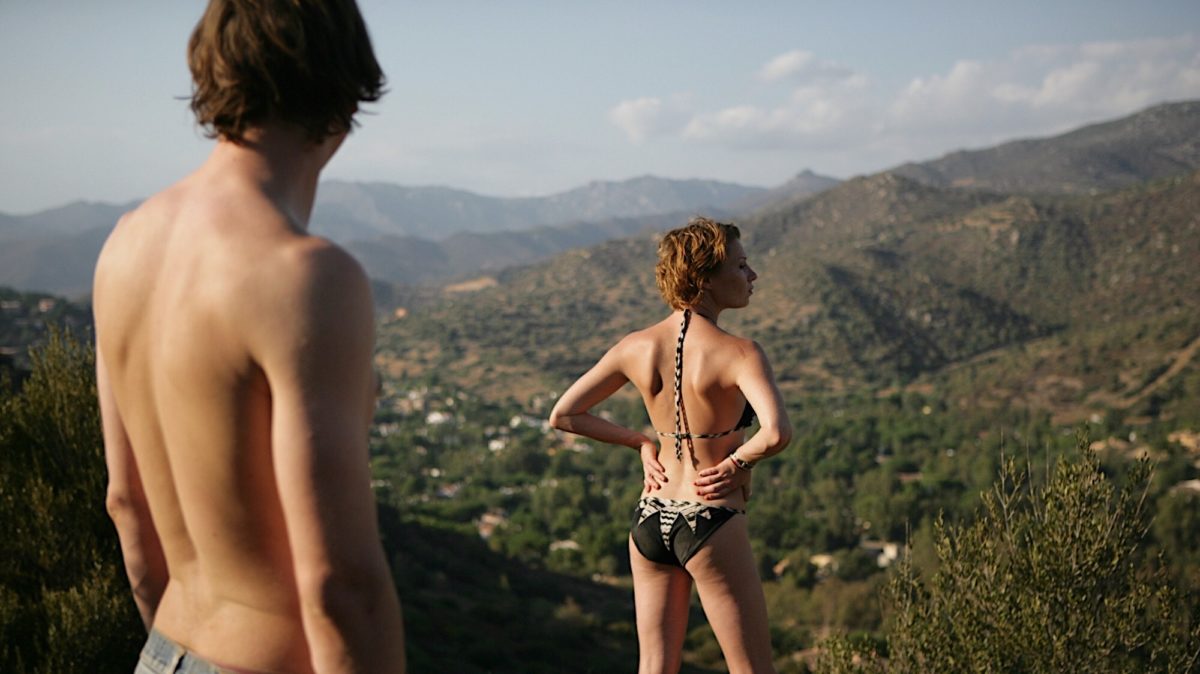
Chris and Gitti both demonstrate gender non-conforming acts of self-expression: Gitti is blunt and boisterous, actively refusing to adopt feminine coded behaviour with an infantile stubbornness that results in public tantrums. By contrast, Chris becomes increasingly self-conscious of his unpresuming and passive presence which could be read as effeminate, associating his failure as an adult with his disconnect from masculinity. Their mutual doubts about the roles they should inhabit as a straight couple of a certain age begin to resurface with the unwelcome intrusion of another, older couple, Hans (Hans-Jochen Wagner) and Sana (Nicole Marischka), two seemingly well-adjusted professionals, both successful and revered in their respective careers, who are anticipating their first born. The ease in which Hans and Sana slip into their roles as husband and wife, and knowingly flaunt it, forces Chris and Gitti to reexamine all of their shortcomings on a microscopic level; while they can function well within their own little bubble, the unavoidable perception and snap judgement of “everyone else” who crosses their path continues to loom over their subconscious. Whether we are aware of it or not, Ade makes us complicit in being the couple’s first critic.
If the Berlin School had conventions to follow, Ade’s film would adhere to a few of its recognisable characteristics in its quiet exploration of Chris and Gitti’s relationship: long, slow takes allow the central couple to explore the idyllic Italian scenery as an open diegetic space, with either character taking their time to initiate frank conversations about the people they hope to become, or at least wish they could be. While Ade’s partially improvised script creates a sense of uncanny realism to the relationship dynamic, her attention to body language and movement (framed beautifully by cinematographer Berhard Keller)—from small intimate gestures to the theatrical displays of self-exhibition—plays a crucial role in informing the audience how the couple see themselves and hope to be seen by others. Early on in the film, Chris asks Gitti if she finds him “manly,” adding that he assumed it would come naturally with age; Gitti reassures him that it is of little importance to her if he is overtly masculine, but that he should do something manly to see if she’ll notice the difference. Later on, Chris confidently wraps his arm around her shoulder, prompting Gitti to burst out laughing, calling him “a terrible actor.” Chris’ body language becomes noticeably more stiff by this emasculating remark. The couple’s backs are turned against us as they so often are throughout the film, their distant silhouettes reminding us that we too remain their spectators, always standing on the periphery from truly grasping the private history they share.
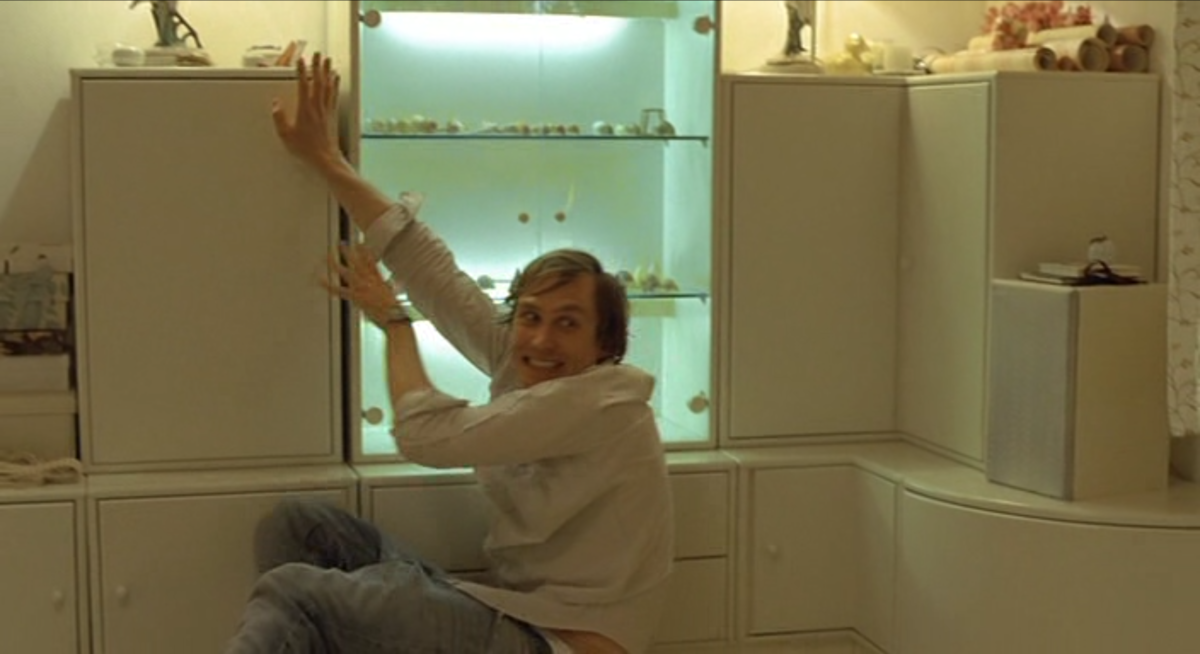
One of the couple’s acts of gender non-conforming behaviour culminates in an impromptu dance performance. While musical theatrics may not seem to fit the minimalist aesthetics of the Berlin School, moments of self-exhibition through unrefined and seemingly unchoreographed dance continue to pervade the film movement: Angela Schanelec’s Place in Cities (Plätze in Städten, 1998), Jan Krüger’s En Route (Unterwegs, 2004), and Valeska Grisebach’s Longing (Sehnsucht, 2006) are just a few examples in which kinetic bodies are made visible by disrupting the phlegmatic flow of their films. As a last-minute solution to avoiding the local discotheque, Chris takes Gitti to his mother’s meditation room to show her the humorous display of ceramic birds. Disappointed by spending the evening in this kitsch environment, Gitti plays a sentimental country ballad by Enrique Inglesias and Willie Nelson, ‘To All The Girls I’ve Loved Before’—reaffirming the Berlin School’s affinity for pop music needledrops, as seen more notably in Christian Petzold’s filmography, who describes its purpose as being a part of the characters’ “lives, desires and visions”—and orders Chris to dance for her. At first embarrassed, Chris is resistant to perform on cue, but eventually closes his eyes to immerse himself in the music. His movements are fluid and delicate, then noticing Gitti’s gaze, he begins to exaggerate his feminine gestures by swinging his arms and hips, before sinking to the ground and draping himself all over the carpet, waist exposed. The performance turns from ironic self-deprecation to genuine raw seduction, with Gitti remaining the voyeur, watching over him as he crawls between her legs.
This role reversal continues in the bedroom as Chris and Gitti make love, her body dominating his. However, her empowerment is only physical. In a later scene Gitti reveals she is afraid of losing him, to which he responds with a kiss. She sighs and tells him “Don’t answer like that,” looking for some verbal reassurance that he still loves her. Chris scrambles for the right response as if his performance for her isn’t over yet; therein lies another layer to their power dynamic, for while Gitti may appear to be the emotionally strong partner, her own insecurities about not conforming to antiquated ideas of femininity and possibly being punished for it worsen the more emotionally withholding Chris becomes in his ambition to self-improve. Their underlying doubts are only exacerbated when confronted by a reflection of who they could be in Hans and Sana, who embrace their heteronormative dynamic and even go so far as to poke fun at Chris and Gitti’s lack of one. Hans in particular calls Gitti’s parenting skills “unconventional,” and when she is provoked into defending Chris’ career choices, he dismissively labels her as a “Brunhilda,” a woman who is fiercely protective of her man. While this could have positive connotations, Hans’ smug demeanor implies a back-handed compliment at play. Chris’ need for validation by an alpha male blinds him from accepting Gitti’s support, consequently reinforcing her belief that in order to follow his path, she must perform as the quiet, polished, docile girlfriend—a woman so remarkably different to her authentic self that just perhaps, she could make him happy.
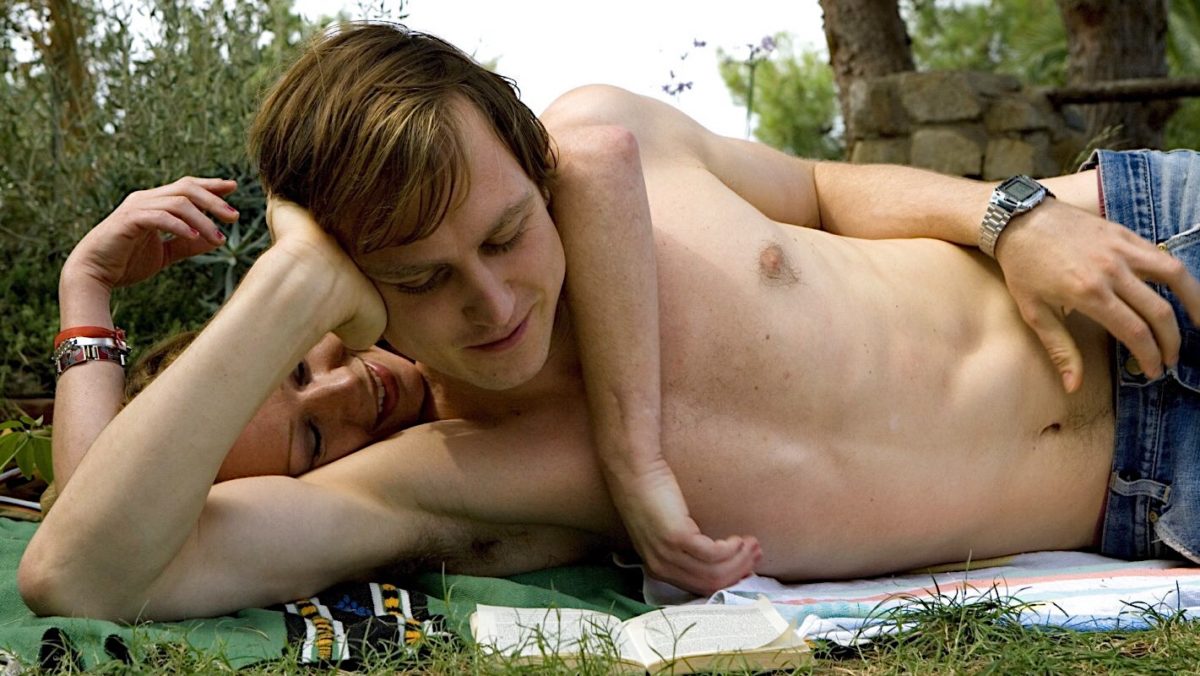
Failing to express their emotions in the reserved, mature manner of Hans and Sana, Chris and Gitti soon abandon their attempts to conform with the rest of ‘bourgeois’ society, proving that they are at their most emotionally in-sync when they are creating a dialogue between their bodies, presenting themselves as unguarded, unashamed, uncorrupted by the outside forces that threaten to alter their nature. Their expressions of love and adoration for each other don’t come in the form of words, but dancing, tender embraces, and blowing raspberries on each other’s bellies, as if they are two children at the cusp of learning basic communication. Taking inspiration from La notte (Michelangelo Antonioni, 1961), Le Mépris (Jean-Luc Godard, 1963), Scenes from a Marriage (Ingmar Bergman, 1973), and A Woman Under the Influence (John Cassavetes, 1974), Ade reworks the post-romantic narrative of doomed relationships and offers a quietly optimistic alternative in which neither of the protagonists are condemned to compromise their individuality in order to commit to one another—a sentiment that has been reflected in the works of Grisebach and Petzold, perhaps suggesting that unconventional romances can triumph over the rigid systems to which we’ve grown accustomed. After all, should Chris and Gitti decide to become parents, they have already proven themselves to be capable of nurturing children. Ade’s cautionary tale interrogates the different facets we put on to either express, embellish, or conceal our personalities to appease those around us as we get older, especially the people we love, for even when we are not filtering our behaviour for the benefit of strangers, we run the risk of withholding our own joy in the most intimate moments by remodeling ourselves on societal ideals of who we should be. Why act like everyone else when our bodies and souls have still so much to give?
